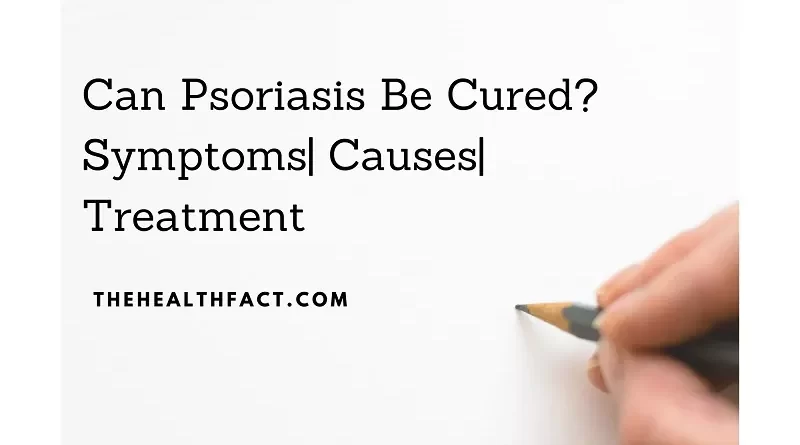Can Psoriasis Be Cured? Symptoms, Causes, and Treatment
Table of Contents
Overview
Individuals with psoriasis are often confused and unsure about the cure of this condition. Can psoriasis be cured? The question always strikes them. However, there is ongoing research on the cure of psoriasis. Though, in many cases, it takes one to 12 months to treat it. And in many cases, patients find their skin clear but flares up again sometimes. It depends on the complexity of the condition.
What Is Psoriasis?
Psoriasis is an autoimmune chronic skin condition in which scaly patches develop on the skin and experience intense redness, itching, and irritation. In typical psoriatic conditions, the skin acquires inflammation and whitish-silvery thick patches. At times, these patches may crack and bleed.
Being an autoimmune skin condition speeds up the skin cell’s production. The normal production of skin cells is one month, but in this condition, it precedes a few days. Due to this overproduction of the skin cells, they form a patchy layer of cells. These overproduced skin cells don’t get enough time to fall off and result in a buildup.
The affected areas include particularly joints, but they may affect any part of the body. These can include:-
- Neck
- Hands
- Scalp
- Face
- Elbows
- knees
Rarely it can affect nails, mouth, and genitals.
Symptoms
The symptoms of psoriasis vary from person to person depending upon the type of psoriasis. The affected area may include some part of the elbow and scalp or either majority of the body.
The common symptom of psoriasis includes:-
- Red, thick, inflamed patches of skin
- Whitish – silver patches
- Dry skin with cracked patches and bleeding
- Itching and irritation around the area
- Swelling and pain in joints
This is possible that some may not feel these symptoms. In some less common types of psoriasis, the symptoms may differ.
Can psoriasis be cured? You may feel cycles of symptoms. For instance, once you came out of the chronic condition after a few days, you may again get the symptoms back.
When you don’t experience active symptoms, it may be your “remission” period. Clearing of active symptoms doesn’t mean it won’t come back. Sometimes, the signs disappear completely and after some triggers of psoriasis, it appears again.
Nonetheless, the symptoms of psoriasis may be associated with some underlying medical conditions such as:-
- Psoriatic arthritis
- Cardiovascular diseases
- Pregnancy complications
- Diabetes type 2
- Anxiety
- Depression
- Cancer
- Chronic obstructive pulmonary disorder
Causes
As this is an auto-immune disease, the response of the immune system is however the cause of this condition. Genetics, on the other hand, has some credit toward it. It can be possible that any family history is the reason for so.
Immunity:- our white blood cells measure our immunity. The white cells particularly help in fighting with the bacteria and all the foreign particles. But in certain cases, these cells start attacking their own cells and thus, produce an auto-immunity effect. Psoriasis is one of those immunity responses of the T-lymphocytes. The mistake in recognizing its own body cells promotes the production of skin cells faster than normal, which results in plaque building of cells. The overproduction of the skin cells takes it to the surface where they form the scaly patches.
Genetics:- genetics also has a big role in the inheritance of some medical conditions. Though, the ratio of people who get psoriasis from family is quite low. Only 2-3 percent of people develop it through genes according to the national psoriasis foundation(NPF). But still, people with a family history of psoriasis remain vulnerable to the possibility of developing the condition.
Concluding, we found that the two triggers are there for causing psoriasis. The first one is immunity and the second one is genetics. But, the chances of inheritance are quite low. So, what can be the other triggers of causing so?
Here are some of those triggers of psoriasis:-
- The cold or dry weather
- Allergies
- Any skin infections or step throat
- Excessive alcohol consumption
- Smoking
- Tattoos
- Consumption of certain medications
- Stress
- Cuts and bruises
Medications including antimalarial and anti-hypertensive and lithium-containing drugs may be the possible reason for psoriasis.
Depending on the type of psoriasis, it affects everybody differently. There are particularly five types of psoriasis.
Psoriasis Types
Plaque psoriasis
It is the commonest type of psoriasis. Almost 80 percent of the individuals affected by such a condition have plaque psoriasis. bet365 arab It particularly affects the elbow, knees, and scalp. plaque psoriasis forms red, inflamed patches which cover some part of the body or either may affect maximum parts. And are often covered with whitish-silver patches. The patches may cause irritation, itching, and a burning sensation.
Nail psoriasis
Fingernails and toenails are also affected by psoriasis. Psoriasis can cause pitting, abnormal growth of nails, and discoloration. The nails might separate from the nail bed due to loosening.
Guttate psoriasis
Guttate psoriasis is common in childhood and among young adults. In this condition, pink spots are observed on arms, legs, and trunk. It is often triggered by certain bacterial infections such as strep throat.
Pustular psoriasis
This forms pustular lesions that cover widespread patches. It affects particularly the small areas of the body like palm, feet, but can cover large areas.
Inverse psoriasis
Inverse psoriasis affects the genitals, buttocks, and breasts. It forms smooth red patches which get worse with friction. Sweating and fungal infection trigger it.
Erythrodermic psoriasis
Erythrodermic psoriasis is a chronic and very common type of psoriasis. It is often characterized by severe sunburn, red rashes that feel burning and itchy. It can cover the entire body of the affected individual. And a slight fever and illness along with this type of psoriasis are not uncommon.
Erythrodermic psoriasis can be life-threatening if not treated in the early stages.
Psoriatic arthritis
It is a severe condition that combines joint pain, swelling. It is often misunderstood by rheumatoid arthritis or gout. The joint symptoms are one of the highlighting symptoms of psoriasis. The inflamed, red skin with plaque differentiates it from other types of arthritis. It can develop with psoriasis. But some individuals are diagnosed with psoriatic arthritis without psoriasis history. Hence, psoriasis and arthritis may or may not be interlinked.
Can Psoriasis Be Cured?
Being an auto-immune disease, this is a little complex to say whether it is properly treatable or not. With some medications and precautions, we can suppress the symptoms. But as we have discussed that it follows a cycle. Sometimes one can feel disappeared symptoms for a few days and reappear again. There is ongoing research on the treatment of psoriasis.
By applying some lifestyle modifications and changes you can suppress the growth and severity of the condition.
Treatment Options For Psoriasis
Psoriasis treatments include topical, oral, or injected medications. As there is no proper cure for psoriasis, the treatment options aim to reduce the active symptoms and slow down the overproduction of skin cells.
Topical medications
Topical corticosteroids:- these are the topical steroids used in various skin-related issues. It possesses anti-inflammatory properties and is available in creams, ointments, and solutions.
Topical retinoids:- it contains medicinal properties derived from vitamin A. retinoids reduce the proliferation and keratinization of the skin cells.
Anthralin:– it is derived from the araroba tree. Anthralin does not contain corticosteroids and works by slowing down the growth of skin cells. It is not used in severe psoriasis conditions.
Vitamin D analogues:– usually vitamin D analogues are used in deficiency of vitamin D. It is quite beneficial in psoriatic conditions being an immunity booster. As psoriasis is an auto-immune disease, vitamin D enhances immunity.
Salicylic acid:– it works as a keratolytic or as a peeling agent. It sheds the outer skin layer. Salicylic acid helps in removing out the psoriatic scales and soften the skin. And is used in a variety of skin problems.
Moisturizers:– moisturizers are good in psoriasis. It makes the skin smooth and moisturized. As well as helps in reducing the scaling of the skin. However, not all moisturizers are good in that condition. Some might worsen the symptoms. العب واربح Thus, choose after consulting the doctor.
Systemic medications
When people don’t get enough improvement from topical or primary methods, then doctors prescribe the oral medications or injected medications for a short period. As these medications have severe side effects, they can’t be used for a prolonged time.
The prescribed medications include:-
Biologics:– biologics are given intravenously. It inhibits your immune system to interact with inflammatory pathways.
Retinoids:- retinoids help in reducing the overproduction of skin cells. Hence, consistent use of retinoids is essential in treating psoriasis. Once you stop the use, the symptoms might reappear.
Pregnant women should avoid the use of retinoids as they may cause birth defects.
Cyclosporin:- it inhibits the immune response and eases minimizing symptoms of psoriasis. But somehow it weakens your immunity. Consequently, it makes you vulnerable to kidney problems and hypertension.
Methotrexate:- it works by suppressing the immune system. However, it has mild side effects when used in low doses. But can cause severe damages when used in the long run. Side effects include liver damage and low production of white blood cells.
We have discussed so far, that psoriasis is not permanently curable. Though, the symptoms might manage to reduce or suppress. But after the remission duration, it can come back. By adopting a healthy lifestyle and taking care of the diet, one can prevent it from getting worse.
Light therapy
Ultraviolet light or natural light is used in the treatment of psoriasis. The sun’s UV light kills the desperately active white blood cells that are attacking healthy skin cells making them grow rapidly. The UAB and UVB, both help control the mild to chronic symptoms of psoriasis.
People have to use more than one type of treatment available for better improvements. Light therapy is one of those treatment options when one has to go with more than one type of treatment. While some patients take only one type of treatment throughout their lives. Patients need to change the treatment type if they feel it non-responsive.
Prevention
Maintain a healthy weight
Obesity is the invitation of a lot of diseases. Hene, if you are overweight, then managing weight would be a good decision. However, it’s not scientifically proven that losing weight can help in getting rid of psoriasis. But overall managing a healthy weight will be good for you.
Avoid the psoriasis trigger foods
As psoriasis causes inflammation. Certain foods also cause inflammation. By avoiding those food products you can prevent psoriasis.
- Dairy products
- Processed foods
- Refined sugar
- Red meat
Follow a heart-healthy diet
Increase your intake of good fats such as omega-3 fats that are found in certain fishes like salmon. Reduce consumption of saturated fats which are found in dairy products and meat. Good fats will help in improving cholesterol levels too.
Avoid alcohol
Heavy consumption may worsen your signs of psoriasis. Start with moderating your quantity and you will be able to cut it out permanently. Aside from reducing psoriatic symptoms, there are other benefits of quitting alcohol.
Manage your mental health
Stress, anxiety are the triggers of psoriasis. Try to figure out why and when do you feel stressed out? And find to manage it accordingly. These are common problems of life. But when it starts affecting your immunity and skin, it is not good for your overall health. Practice meditation and yoga. Apply breathing techniques for anxiety when you feel so. Don’t avoid your emotional health.
Conclusion
Psoriasis is a chronic autoimmune skin condition in which red, inflamed patches of skin are formed. Often, silver-whitish patches are observed. Individuals with psoriasis have a common question that can psoriasis be cured? Well, there is no permanent psoriasis treatment yet. However, the symptoms may be suppressed by topical and systemic medications. Psoriatic arthritis is also a condition connected to joint pain and swelling. Though psoriatic arthritis may or may not be intertwined with psoriasis history in some individuals. Usually, the psoriasis patient develops it at a later stage of psoriasis. العاب سلوتس While some develop it without any history of psoriasis.
Frequently Asked Questions
Can psoriasis go away permanently?
Psoriasis is a severe skin condition that is not curable and doesn’t go on its own. Although, people feel clear skin for many years and then again it flares up in between when the skin is poor. The duration of the disease might be different in people. When some feel milder symptoms, psoriasis could be severe to some drastically. Treatments also depend upon the severity of the condition and sometimes multiple treatments are done for suppressing the symptoms. It may be possible that the milder symptoms will go away on their own, however, not permanently can be flared up again.
How do you permanently treat psoriasis?
There are some home methods which you should apply for a fast recovery from the illness. Some of them are listed below:-
Dietary supplements such as fish oil, aloe vera, milk thistle, vitamin D, are proven good for minimizing the symptoms of psoriasis according to the national psoriasis foundation.
Don’t let your skin dry, use a moisturizer after a wash and use humidifier to prevent skin dryness from the air
Avoid scented skin products, they may smell nice but can also worsen your psoriasis
Eat well, especially the good oil products such as olive oil, nuts, and omega fatty acids.
Soak your body either in mineral oil, Epsom salt, olive oil, or milk to soothe the inflammation and itchy scales over the skin.
Don’t stress yourself and practice yoga and meditation
Avoid drinking and smoking, they may impact your skin negatively.
Use turmeric, it helps in reducing the psoriasis flares up.
What is the main cause of psoriasis?
Psoriasis is an autoimmune disease in which the skin cells fight against each other recognizing them as a foreign body. Usually, the white blood cells help in fighting with the bacterias and viruses, while in some cases it starts to attack its cells leaving the skin scaly and patchy which results in a severe skin condition psoriasis. Autoimmune disease affects different types and psoriasis is one of those types.
The overproduction of skin cells brings unpleasant symptoms. Moreover, psoriasis may also be genetically inherited by your parents.
Why is there no cure for psoriasis?
Psoriasis has no cure because it’s a severe auto-immune disease that develops when your skin cells start attacking themselves and build a patchy skin lesion that irritates and inflames your skin. From appropriate treatment, it can be suppressed, but it can be flared up again after a remission period. A remission period is when the symptoms disappear for some time, and then suddenly grow up again like it’s never gone.
The treatment continues for a long time and may continue for a lifetime. Also, symptoms differ in every individual. Thus, two patients with psoriasis may have different types of treatment.
What happens if psoriasis is left untreated?
If psoriasis is left untreated it may lead to a more severe condition called psoriasis arthritis which affects joints in later stages. Also, some medical conditions may arise along with psoriasis-like cardiovascular disease, joint damage like joint stiffness, swelling around joints. And the buildup of skin patches will continue with bleeding and cracks. The symptoms can be painful, irritating with severe itching.
Does psoriasis worsen with age?
Usually, psoriasis develops in the age between 15-35. The conditions of psoriasis depend on environmental factors, not on age. It may get better or worse according to the weather conditions and the functions going inside the body. However, stress and obesity are the triggers for worsening psoriasis. The longer you have psoriasis, the more susceptible you to other psoriasis-related health conditions. But it won’t make you look older, you look your age even in severe conditions.
Why do I suddenly have psoriasis?
Sudden psoriasis may be the flare-up of psoriasis arising due to the triggers of psoriasis. In some people, the only reason for sudden psoriasis is the event of triggers that make the symptoms more severe and irritable. Some common triggers include a skin injury, an insect bite, or sunburn. Besides this, hormonal changes, and certain medications like antimalarial, anti-hypertensive, and anti-inflammatory medicines including NSAIDs might cause a sudden breakout of psoriasis.
What organs can be affected by psoriasis?
Psoriasis affects the immune system by the overproduction of skin cells that lead to patchy, scaly, and inflamed skin that irritates you intensely. It affects various parts of the body including the neck, elbow, knees, scalp, hands, and face. Genitals, nails, and mouth are rarely affected by it. However, due to its accelerated immune response, it can affect the lungs too. Some researchers believed that psoriasis is related to insulin resistance and affects metabolism.
What is the best treatment for psoriasis?
Well, we can’t say any treatment is worse or bad, as every treatment depends upon the severity of psoriasis. But we can choose a more appropriate option for one’s treatment. Some topical corticosteroids in the form of creams and lotions are used in mild to moderate symptoms of psoriasis. These topical steroids work by reducing inflammation, slowing the growth of skin cells, and overcoming itching.
What should you not do if you have psoriasis?
You should know the triggers and risk factors for psoriasis to prevent it from being severe. If you have psoriasis, you should be careful about what you are consuming, and what’s your lifestyle.
Here is the list of foods to avoid in psoriasis:-
- Red meat such as beef
- Eggs and other dairy products
- Processed foods, higher in salt, sugar, and fat
- Gluten such as wheat, barley, and rye, etc.
- Nightshades like potatoes, tomatoes, and peppers
- Quit alcohol consumption
Apart from this, stress and obesity are also not good for such conditions. Thus, develop a routine with exercise and free from stress.



